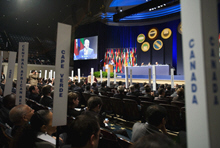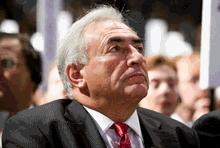
Typical street scene in Santa Ana, El Salvador. (Photo: iStock)
IMF Survey: Amid Market Crunch, Calls for Stronger IMF
October 23, 2007
- Many discussions centered on lessons to be drawn from market turbulence
- Major focus also was progress on IMF's two-year program to reform quota shares
- New IMF head will work closely with newcomers at World Bank, IMFC
With market turbulence exposing fault lines in parts of the international financial system, the IMF wrapped up its 2007 Annual Meetings amid calls for the multilateral institution to strengthen its role as a global financial watchdog and revamp its governance.

Plenary session of 2007 Annual Meetings: gathering coincided with watershed in global economic growth (IMF photo)
2007 ANNUAL MEETINGS
Finance ministers and central bank governors from around the world met October 20-22 in Washington D.C. for the IMF-World Bank meetings at a time of renewed concerns about the fallout from the U.S. subprime mortgage meltdown. Outgoing IMF Managing Director Rodrigo de Rato told delegates from the 185 member countries on October 22 that the resulting market turbulence was akin to "an earthquake in the credit markets."
The meetings also coincided with a watershed in global economic growth. Three major emerging markets—China, India, and Russia—now account for more than half of world growth, according to the just released IMF World Economic Outlook. This development puts into sharp focus the intended reform to give emerging markets a bigger say at the IMF, where representation, as with many international institutions, still reflects a post-World War II balance of power.
De Rato stressed that the question now is whether the global economy has reached a turning point after five years of strong growth. The IMF is predicting that world growth will slow from 5. 2 percent in 2007 to 4.8 percent in 2008, compared to 5.4 percent growth in 2006. So far, the emerging markets have largely escaped the fallout from the U.S. and European credit crunch. In fact, de Rato noted, "emerging economies have become a source of stability in the global economy—something that would have been unthinkable a few years ago."
The Group of 24 developing countries also pointed out that "developing countries are a new driving force as well as a stabilizing factor in the world economy," and called on the IMF to strengthen its surveillance of financial systems in advanced economies.
Financial stability `genies'
Tommaso Padoa-Schioppa, the chair of the IMF's policy guiding committee—the International Monetary and Financial Committee (IMFC)—told reporters that while recent market turbulence had been countered by determined action by several central banks, it had also "revealed a number of problems that may be deeper than the specific episode that triggered the tensions."
"There are developments in the financial system which are like genies which moved out of the bottle and are hard to follow," he stated. "There is a clear need for supervisory bodies, and even for the very financial institutions which create these new instruments, to understand better what their creatures are doing out in the market. This is clearly a reason for concern." But he added that the good news was that the disturbance had occurred at a time of abundant liquidity around the world when economies were strong.

IMF Managing Director-designate Dominique Strauss-Kahn, who takes office November 1, attends Annual Meetings plenary session (IMF photo)
Much of the discussions over the three days—both in the official meetings and in seminars lined up by the IMF and World Bank and nearby think-tanks—centered on what lessons could be drawn from the recent turbulence, the global economic and financial outlook, and the next steps in the agendas of the Fund and the World Bank.
The IMFC said financial innovation and securitization, while having contributed to enhanced risk diversification and improved market efficiency, had also created new challenges "that need to be properly addressed." It pinpointed five areas to be addressed, in particular: risk management practices related to complex structured products; valuation and accounting for off-balance sheet instruments, especially in times of stress; clarifying the treatment of complex products by ratings agencies; addressing basic principles of prudential oversight for regulated financial entities; and liquidity management.
The IMFC asked the IMF—working with the Financial Stability Forum, the Bank for International Settlements and others—to deepen its work on these issues and report back at the next IMFC meeting, which will be held in Washington on April 12, 2008. It encouraged the IMF to continue to "broaden and deepen its financial expertise to identify future issues." It asked the Fund to better integrate the findings of its surveillance of the global economy into its monitoring of individual economies and regional groups. In addition, it welcomed the IMF's ongoing work on sovereign wealth funds.
A louder voice
A major focus of the IMFC meeting was progress on the IMF's two-year program to reform the system of quota shares to better reflect members' evolving weight in the global economy. The program, which was launched in Singapore one year ago, began with an ad hoc increase for the four most underrepresented countries: China, Korea, Mexico, and Turkey. Many emerging markets and developing countries expressed concerns about the depth of the reform and the likelihood that they would secure sufficient voice in the running of the institution.
Padoa-Schioppa told reporters that enough progress had been made over the past year to give hope that the essential elements of a reform package could be worked out by the spring meetings. There is now agreement on the need for a shift in voting shares towards emerging and developing countries as a whole; a total quota increase of about 10 percent; and at least a doubling of basic votes to protect the position of low-income countries. The intention is to achieve final consensus on the reform at the fall Annual Meetings in 2008.
A time of transition and expenditure restraint
Former French finance Minister Dominique Strauss-Kahn, who takes over from de Rato on November 1, will have to spearhead the quota reform effort, along with other IMFC requests—including putting the IMF's finances on a sustainable footing. Over the next six months, the IMFC has asked the IMF to put together a new income model and expenditure framework, with a medium-term budgetary envelope for FY09 that is consistent with the framework. The IMF is already embarked on a 6 percent cut in expenditures in real terms during 2006-08.
Strauss-Kahn will be working closely with two other newcomers: World Bank President Robert Zoellick, who took over the reins of the IMF's sister institution four months ago, and Italy's Economy and Finance Minister, Padoa-Schioppa, who was selected last month to succeed the United Kingdom's Gordon Brown as IMFC chair.


